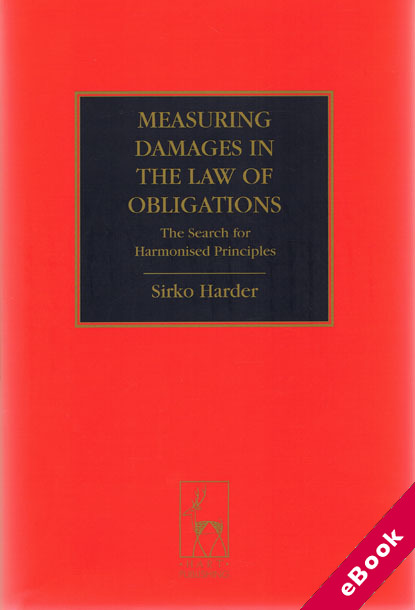Measuring Damages in the Law of Obligations: The Search for Harmonised Principles (eBook)
ISBN13: 9781847317476
Published: July 2010
Publisher: Hart Publishing
Country of Publication: UK
Format: eBook
(ePub)
Price: £90.00
The amount of VAT charged may change depending on your location of use.
The sale of some eBooks are restricted to certain countries. To alert you to such restrictions, please select the country of the billing address of your credit or debit card you wish to use for payment.
Sale prohibited in
Due to publisher restrictions, international orders for ebooks may need to be confirmed by our staff during shop opening hours. Our trading hours are Monday to Friday, 8.30am to 5.00pm, London, UK time.
The device(s) you use to access the eBook content must be authorized with an Adobe ID before you download the product otherwise it will fail to register correctly.
For further information see https://www.wildy.com/ebook-formats
Once the order is confirmed an automated e-mail will be sent to you to allow you to download the eBook.
All eBooks are supplied firm sale and cannot be returned. If you believe there is a fault with your eBook
then contact us on
ebooks@wildy.com and we will help in resolving the issue. This does
not affect your statutory rights.
Need help with
ebook formats?
This book challenges certain differences between contract, tort and equity in relation to the measure (in a broad sense) of damages.
Damages are defined as the monetary award made by a court in consequence of a breach of contract, a tort or an equitable wrong. In all these causes of action, damages usually aim to put the claimant into the position the claimant would be in without the wrong. Even though the main objective of damages is thus the same for each cause of action, their measure is not.
While some aspects of the measure of damages are more or less harmonised between contract, tort and equity (e.g. causation in fact and mitigation), significant differences exist in relation to:-
- Remoteness of damage, which is the question of whether, when and to which degree damage needs to be foreseeable to be recoverable;
- The compensability of non-pecuniary loss such as pain and suffering, distress and loss of reputation;
- The effect of contributory negligence, which is the victim's contribution to the occurrence of the wrong or the ensuing loss through unreasonable conduct prior to the wrong;
- The circumstances under which victims of wrongs can claim the gain the wrongdoer has made from the wrong; and
- The availability and scope of exemplary (or punitive) damages.
For each of the five topics, this book examines the present position in contract, tort and equity and establishes the differences between the three areas. It goes on to scrutinise the arguments in defence of existing differences. The conclusion on each topic is that the present differences between contract, tort and equity cannot be justified on merits and should be removed through a harmonisation of the relevant principles.
